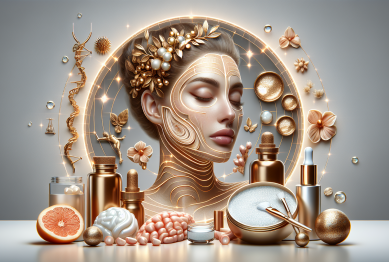Discover how incorporating proven daily skincare habits can nurture radiant, healthy skin and support lasting beauty. This guide explores accessible wellness strategies, routine steps, and real expert insights to help unlock a glowing complexion—without over-the-top promises or confusing jargon.
Skincare Foundations Many People Overlook
Building radiant skin starts with understanding foundational wellness steps that often get ignored. While many search for the next trendy serum or miracle cream, the basics—like regular cleansing, gentle hydration, and effective sun protection—form the backbone of any glowing complexion. Experts highlight that consistent skin care routines deliver sustainable results, no matter age or skin type (Source: https://www.aad.org/public/everyday-care/skin-care-basics). These daily habits may seem simple, yet they powerfully support skin’s own renewal cycles and natural barrier.
Hydrating the skin both topically and through adequate water intake plays a crucial role in skin’s texture and appearance. Dehydrated skin is more prone to dryness, dullness, and faster aging. Using gentle cleansers followed by a moisturizer tailored to your skin type helps maintain that vital hydration layer without disrupting the microbiome. Even for oily or breakout-prone skin, experts recommend avoiding harsh cleansers to prevent over-stripping and rebound oiliness. Little shifts, like using lukewarm rather than hot water, also have a noticeable impact—keeping skin calm and balanced (Source: https://www.ncbi.nlm.nih.gov/pmc/articles/PMC6017965/).
The importance of daily sun protection cannot be overstated. Ultraviolet exposure is the leading external cause of premature skin aging, pigment changes, and even skin cancers. Dermatologists now encourage broad spectrum sunscreen year-round—even on cloudy days or while indoors near windows. Some mineral and chemical sunscreens also deliver antioxidant benefits to counter free radical damage. By integrating sunscreen into the morning routine, it becomes a seamless habit that pays dividends over time, supporting skin’s youthful appearance and health (Source: https://www.cancer.org/cancer/skin-cancer/prevention-and-early-detection/sunscreen-and-sun-safety.html).
Nutrition’s Surprising Role in Glowing Skin
What’s on the plate often shows up in the mirror. Nutrient-dense foods and healthy hydration aren’t just buzzwords—they directly support skin’s structure, tone, and healing abilities. Studies highlight that diets rich in colorful fruits and vegetables deliver antioxidants, vitamins, and minerals that defend against oxidative stress and environmental aggressors (Source: https://www.hsph.harvard.edu/nutritionsource/vitamins/vitamin-c/). Citrus, berries, leafy greens, and bell peppers pack plenty of vitamin C, which is linked to collagen synthesis and brighter skin.
Healthy fats, like omega-3 fatty acids from salmon, walnuts, or flaxseed, also contribute to supple skin and help manage inflammation. These fats play a role in stabilizing cell membranes and locking in moisture. Additionally, some research connects regular probiotic consumption (found in yogurt and fermented foods) with clearer skin for some individuals. The gut-skin connection fascinates researchers, and balancing gut health might indirectly support clearer, more resilient skin for certain people (Source: https://www.ncbi.nlm.nih.gov/pmc/articles/PMC4367209/).
Staying mindful of highly processed foods, excessive sugar, and simple carbs may further reduce the risk of breakouts or dullness linked to blood sugar spikes and systemic inflammation. While no single diet universally guarantees perfect skin, consistent, balanced eating habits offer a strong foundation for anyone seeking lasting, visible skin wellness. Even small improvements, like swapping sweetened beverages for water or herbal tea, can amplify the skin’s natural luminosity over time.
Everyday Habits That Impact Complexion
Simple lifestyle patterns have outsized effects on skin’s health—from sleep routines to daily movement. Consistent, restorative sleep allows the body to repair damage and renew skin cells overnight. Missing out on high-quality sleep, however, can quickly show up as dullness, puffiness, or under-eye circles. In fact, sleep deprivation has been scientifically linked to faster skin aging and weakened barrier function (Source: https://www.sleepfoundation.org/physical-health/how-sleep-affects-skin).
Gentle movement and regular exercise are other often-overlooked pillars of glowing skin. Activities like walking, yoga, or cycling increase blood flow, improving oxygen delivery and nutrient supply to skin’s surface. Exercise also helps regulate stress hormones, which are closely tied to breakouts and inflammatory skin concerns for some people. Even light daily movement can gradually foster better tone, texture, and overall skin radiance.
Good hygiene practices, like washing pillowcases, towels, and makeup brushes regularly, may help minimize the buildup of oils and bacteria that can aggravate the skin. Being mindful not to touch the face during the day is also important for preventing the spread of bacteria and irritation. These everyday habits—though seemingly small—build up into a framework of consistently healthier, calmer skin without extreme measures or expensive interventions.
Stress and Skin: The Real Connection
Growing evidence reveals direct links between ongoing stress and common skin disruptions such as acne, dryness, and flare-ups of eczema or psoriasis. High stress levels may trigger increased oil production, slow wound healing, and disrupt skin barrier repair. The resulting inflammation can show up as sensitivity, redness, or breakouts that feel stubborn to treat. Acknowledging this mind-skin link empowers many people to consider stress management as an active part of their skincare routine (Source: https://www.ncbi.nlm.nih.gov/pmc/articles/PMC6422440/).
Simple mindfulness practices, gentle breathing, and short breaks during the day can help reduce stress’ negative impact on skin. Some individuals find journaling or meditative activities—like drawing, gardening, or mindfulness apps—support smoother emotional balance. Over time, a calmer mind is often reflected in a more even, glowing complexion as stress hormone levels settle.
Building resilience against stress also includes setting healthy boundaries, nurturing supportive relationships, and ensuring adequate downtime. Skin wellness comes from looking at the bigger picture, not just topical treatments. By addressing the sources of daily stress, many find that both their mood and their skin visibly improve—reinforcing the powerful, ongoing connection between mind and body.
Daily Beauty Routines That Really Work
Crafting a sustainable daily routine does not require a dozen specialized products. Instead, experts recommend tailoring a minimal yet effective set of steps that align with skin’s actual needs. Typical routines might consist of cleansing, hydrating with moisturizer or serum, and applying broad spectrum sunscreen in the morning. At night, gentle makeup removal and targeted treatments—such as retinoids, peptides, or ceramides, depending on the goal—are common.
Listening to skin’s natural rhythms makes this routine more effective. On days when skin feels dry, a richer moisturizer or occasionally gentle exfoliation may be helpful. When skin is more oily or breakout-prone, a lightweight, non-comedogenic formula can prevent clogged pores. Adaptability is key: as skin’s needs shift with weather, stress, or age, adjusting products and steps maintains healthy balance and long-term glow (Source: https://www.mayoclinic.org/healthy-lifestyle/adult-health/in-depth/skin-care/art-20048237).
Establishing a consistent routine trains the skin and supports better results over time than sporadic, high-intensity treatments. Keeping it simple also helps reduce risk of irritation and allows tracking what genuinely works. Many people find that prioritizing sleep, nutrition, sun protection, and stress management is just as essential as the topical steps themselves for achieving lasting, healthy beauty.
Choosing Skincare That Supports Wellness
Deciding which products to introduce into a beauty routine can feel overwhelming with so many options available. Start by identifying your primary skin goals—whether that’s managing dryness, dullness, sensitivity, or supporting aging skin. Look for gentle, fragrance-free options and clinically supported ingredients such as niacinamide, ceramides, hyaluronic acid, or antioxidants. Always check reputable sources and, if possible, patch test new items before widespread use to avoid irritation (Source: https://www.fda.gov/cosmetics/cosmetic-labeling-claims/cosmetics-safety-qs).
Transparency in labeling and understanding ingredient lists empower people to make educated choices that align with wellness-focused values. Increasingly, brands are providing detailed information about product sources, sustainability, and evidence-backed benefits. Trustworthy organizations and dermatology societies also publish regular updates about ingredient safety, common allergens, and emerging research—helpful for anyone who wants the facts before making decisions.
While trendy treatments and luxury packaging may attract attention, the core of skin wellness remains in habits, consistency, and educated choices. Focusing on personal needs—rather than hype—fosters a tailored approach that suits your lifestyle, budget, and skin goals. Ultimately, skin wellness is a journey shaped by daily care, mindfulness, and informed experimentation rather than overnight fixes.
References
1. American Academy of Dermatology Association. (n.d.). Skin care basics. Retrieved from https://www.aad.org/public/everyday-care/skin-care-basics
2. Darlenski, R., & Fluhr, J. W. (2012). Influence of skin type, race, and gender on skin hydration. Retrieved from https://www.ncbi.nlm.nih.gov/pmc/articles/PMC6017965/
3. American Cancer Society. (n.d.). Sunscreen and sun safety. Retrieved from https://www.cancer.org/cancer/skin-cancer/prevention-and-early-detection/sunscreen-and-sun-safety.html
4. Harvard T.H. Chan School of Public Health. (n.d.). Vitamin C. Retrieved from https://www.hsph.harvard.edu/nutritionsource/vitamins/vitamin-c/
5. West, C. E., et al. (2015). Probiotics and skin health: a review. Retrieved from https://www.ncbi.nlm.nih.gov/pmc/articles/PMC4367209/
6. The Sleep Foundation. (n.d.). How sleep affects skin. Retrieved from https://www.sleepfoundation.org/physical-health/how-sleep-affects-skin









